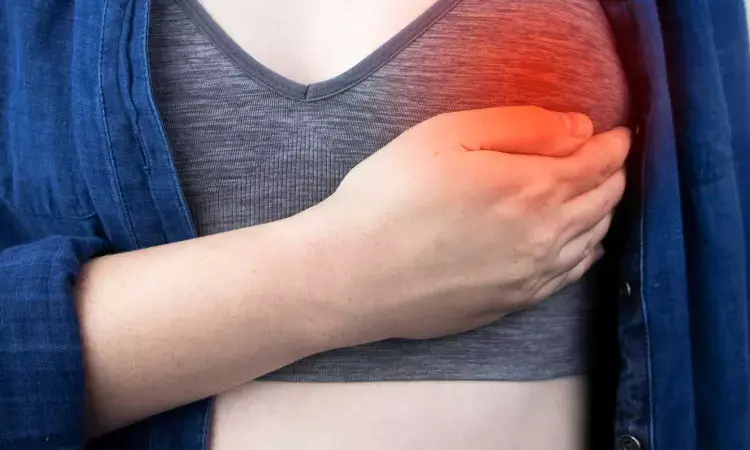- Home
- Medical news & Guidelines
- Anesthesiology
- Cardiology and CTVS
- Critical Care
- Dentistry
- Dermatology
- Diabetes and Endocrinology
- ENT
- Gastroenterology
- Medicine
- Nephrology
- Neurology
- Obstretics-Gynaecology
- Oncology
- Ophthalmology
- Orthopaedics
- Pediatrics-Neonatology
- Psychiatry
- Pulmonology
- Radiology
- Surgery
- Urology
- Laboratory Medicine
- Diet
- Nursing
- Paramedical
- Physiotherapy
- Health news
- Fact Check
- Bone Health Fact Check
- Brain Health Fact Check
- Cancer Related Fact Check
- Child Care Fact Check
- Dental and oral health fact check
- Diabetes and metabolic health fact check
- Diet and Nutrition Fact Check
- Eye and ENT Care Fact Check
- Fitness fact check
- Gut health fact check
- Heart health fact check
- Kidney health fact check
- Medical education fact check
- Men's health fact check
- Respiratory fact check
- Skin and hair care fact check
- Vaccine and Immunization fact check
- Women's health fact check
- AYUSH
- State News
- Andaman and Nicobar Islands
- Andhra Pradesh
- Arunachal Pradesh
- Assam
- Bihar
- Chandigarh
- Chattisgarh
- Dadra and Nagar Haveli
- Daman and Diu
- Delhi
- Goa
- Gujarat
- Haryana
- Himachal Pradesh
- Jammu & Kashmir
- Jharkhand
- Karnataka
- Kerala
- Ladakh
- Lakshadweep
- Madhya Pradesh
- Maharashtra
- Manipur
- Meghalaya
- Mizoram
- Nagaland
- Odisha
- Puducherry
- Punjab
- Rajasthan
- Sikkim
- Tamil Nadu
- Telangana
- Tripura
- Uttar Pradesh
- Uttrakhand
- West Bengal
- Medical Education
- Industry
Breast Cancer Treatments Linked to Increased Risk of Type 2 Diabetes

A new study published in Breast Cancer Research and Treatment raised concerns about the potential link between breast cancer and an increased risk of type 2 diabetes (T2D), with a particular focus on the impact of breast cancer treatments.
The research team conducted an extensive search through PubMed, Embase, and references of relevant papers for studies exploring the interplay between breast cancer, its treatments, and the subsequent risk of T2D. Random-effects models were employed to calculate effect estimates and associated 95% confidence intervals concerning the association between breast cancer, adjuvant breast cancer treatments (including endocrine therapy and chemotherapy), and the risk of developing T2D. Publication bias was assessed through the use of funnel plots.
The comprehensive analysis encompassed 15 eligible studies, with 10 of them focusing on T2D risk following breast cancer diagnosis or various treatments. Notably, five studies delved into more than one association.
The findings revealed that patients with a history of breast cancer faced an elevated risk of developing T2D compared to those without breast cancer (Effect Estimate (EE) = 1.23, 95% Confidence Interval (CI) = 1.13–1.33). Similarly, individuals who underwent any form of endocrine therapy exhibited an increased risk of incident T2D (EE = 1.23, 95% CI = 1.16–1.32).
For breast cancer patients, the risk of developing T2D was notably higher in those who received tamoxifen compared to those who did not (EE = 1.28, 95% CI = 1.18–1.38). However, due to limited available data, the analyses regarding T2D risk after treatment with aromatase inhibitors or chemotherapy remained inconclusive.
This study underscores the potential link between breast cancer and an elevated risk of developing type 2 diabetes, particularly in individuals who have undergone tamoxifen therapy as part of their breast cancer treatment. While the results for aromatase inhibitors and chemotherapy remain uncertain due to insufficient data, the findings emphasize the importance of monitoring and managing the metabolic health of breast cancer survivors.
Further research is essential to elucidate the precise mechanisms underlying this association and to provide better guidance for healthcare professionals in managing the long-term health of breast cancer survivors. In the meantime, healthcare providers should consider regular monitoring and lifestyle interventions to mitigate the potential risk of T2D in this vulnerable population.
Source:
Jordt, N., Kjærgaard, K. A., Thomsen, R. W., Borgquist, S., & Cronin-Fenton, D. (2023). Breast cancer and incidence of type 2 diabetes mellitus: a systematic review and meta-analysis. In Breast Cancer Research and Treatment. Springer Science and Business Media LLC. https://doi.org/10.1007/s10549-023-07043-6
Neuroscience Masters graduate
Jacinthlyn Sylvia, a Neuroscience Master's graduate from Chennai has worked extensively in deciphering the neurobiology of cognition and motor control in aging. She also has spread-out exposure to Neurosurgery from her Bachelor’s. She is currently involved in active Neuro-Oncology research. She is an upcoming neuroscientist with a fiery passion for writing. Her news cover at Medical Dialogues feature recent discoveries and updates from the healthcare and biomedical research fields. She can be reached at editorial@medicaldialogues.in
Dr Kamal Kant Kohli-MBBS, DTCD- a chest specialist with more than 30 years of practice and a flair for writing clinical articles, Dr Kamal Kant Kohli joined Medical Dialogues as a Chief Editor of Medical News. Besides writing articles, as an editor, he proofreads and verifies all the medical content published on Medical Dialogues including those coming from journals, studies,medical conferences,guidelines etc. Email: drkohli@medicaldialogues.in. Contact no. 011-43720751


